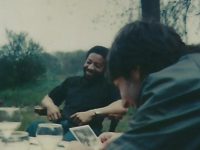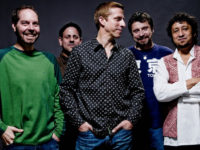At the same time that Miles Davis was pioneering a spacious, hypnotic type of jazz-rock fusion, his recently departed drummer Tony Williams was inventing a more explosive, intense variety of fusion borne of hard-nosed jamming originally with guitarist John McLaughlin and organist Larry Young. Williams’ seminal Lifetime band isn’t mentioned in a conversation about game-changing fusion as much as Miles, but it’s arguably just as influential, and it’s a safe bet they’re explicitly thought of more by the harder-edged practitioners of this style than its listeners.
Which brings us to Spectrum Road. Living Colour guitarist Vernon Reid has long been associated with music on the frayed end of electric jazz, and thus has a deep appreciation for Tony Williams’ groundbreaking music. Some time back Reid bounced around the idea of piecing together a Lifetime tribute band with Jack Bruce as the two were touring Europe.
Eventually, they got Medeski Martin & Wood keyboardist and former Lenny Kravitz drummer Cindy Blackman Santana on board, got everyone’s schedules synced up, named themselves Spectrum Road after the Lifetime song “Spectrum,” and began to tour playing Lifetime songs. At some point, related Reid to Something Else! recently, “some other thing clicked in with the four of us. We entered in from another place. It was much more intimate. It had been tight before, but there was something else going on.” That’s when they decided to duck into a studio at the first layover, and this self-titled album, Spectrum Road is the result.
You can go back to the output of each of these musicians and trace some of its lineage back to Lifetime. Blackman even made her own Lifetime tribute album called Another Lifetime (2010) that until now was the best such testimonial to the power and barrier-busting music of Williams’ band. Bruce’s connection is more direct, as he was a member of that band in 1970-71 and recorded Turn It Over and Ego with them. But Spectrum Road isn’t a straight copy of the original, and that has more to do with the strong musical personalities of each of the players than any extensive reworking of the arrangements (of which there aren’t many). They can’t help being themselves, and we wouldn’t have them be any other way.
They’re also smart enough and good enough to carry over the spirit and raw energy of the genuine article but to do so in their own voices. “Vuelta Abajo” (video of live performance below) is a hard kick to the crotch of the pants, with Blackman pushing forward the rest of the group, just as her hero did, but using her own arsenal of fills and blasts to propel the song. And everyone else is just playing their asses off, too: Bruce travels up into the upper register of his bass guitar in a funky gait locked in perfect sync with Blackman, Reid is shredding like he’s playing for Living Colour and dueling a 1970 John McLaughlin, and Medeski is bringing down the B-3 thunder, complementing it with a Mellotron (which Young never did, but you know what? It fits).
Just as everyone gets worked up to a frenzy, the repeating bass figure that begun to appear a couple minutes into the song forms the basis for a series of climatic false endings, except no one told Medeski and he conjures up monster swells precipitating the re-entry of the opening sequence. Inspired; brilliant.
[SOMETHING ELSE! INTERVIEW: Vernon Reid discusses the incendiary fusion collaboration Spectrum Road, how jazz has informed his playing from the start – and bursting onto the scene with Living Colour.]
The psychedelic churn of “There Comes A Time” is replicated intact, but Reid adds an acid toned, jazz tinged rock guitar that’s a league or two above Ted Dunbar’s original delivery (which wasn’t too shabby, either). Williams’ riddles which came off as a hypnotic chant in the original is sung with more feeling by the voice of Cream, whose pipes remains in decent shape. Blackman subs for Williams’ voice amid drum eruptions on “Where,” but that’s an insignificant part compared to her intricate stick work meted out over Bruce’s high-end bass riff. It gets even better when the song opens up fully and Medeski tears off one of his signature B-3 bombastic shows; Bruce’s bass playing in support of it is pretty phenomenal as well. Bruce again assumes the mic for “One Word,” reprising the same ascending chord vocal turn he performed more than 40 years ago for Lifetime.
“Vashkar,” the Carla Bley-penned song from Emergency! that Blackman covered no less than three times on her own tribute album, functions as a well-oiled vehicle for close interaction. Young’s delightfully schizophrenic “Allah Be Praised” gets covered here, too, and Medeski nearly outdoes the composer’s memorable organ improvising of the original. “Wild Life” is the lone entry from Williams’ Alan Holdsworth-era Lifetime, a more polished product than the first three albums. Spectrum Road gives it an edgier sound and it’s interesting to hear Reid approximate Holdsworth’s legato phrasings, but in his own dialect.
Jan Hammer’s composition “Coming Back Home” is the only Williams selection not from a Lifetime record — it originated on the immediate post-Lifetime album The Joy Of Flying (1978) — but Medeski lights a fire under this, re-imagining this song as how the Lifetime group of 1970 might have handled it. “Blues For Tillmon” was written by the Spectrum Road band in reference to Williams’ middle name, a blues played in a more traditional jazz style, but with an avant garde bent that Williams, who once had Cecil Taylor help him perform a Taylor tune on one of his albums, would have loved.
Fusion jazz is a music form where there’s been very little out there truly fresh and new for a long while. Sometimes you’ve got to go all the way back before you can more forward again. Spectrum Road reintroduces the limitless possibilities that were abundant at the beginning, when Williams and his fearless Lifetime band were racing across the frontier and leaving most everyone behind. Here is a supergroup that actually lives up to the billing, making their debut album the rock-jazz event of the year. And Tony Williams’ legacy gets a long overdue upgrade.
Spectrum Road goes on sale June 5 by Palmetto Records.
- Ivo Perelman + Tom Rainey – ‘Duologues 1-Turning Point’ (2024) - May 10, 2024
- Jeff Oster, Vin Downes + Tom Eaton – ‘Seven Conversations’ (2024) - May 6, 2024
- David Torn – ‘Adityahridayam 321’ (2024) - May 5, 2024




